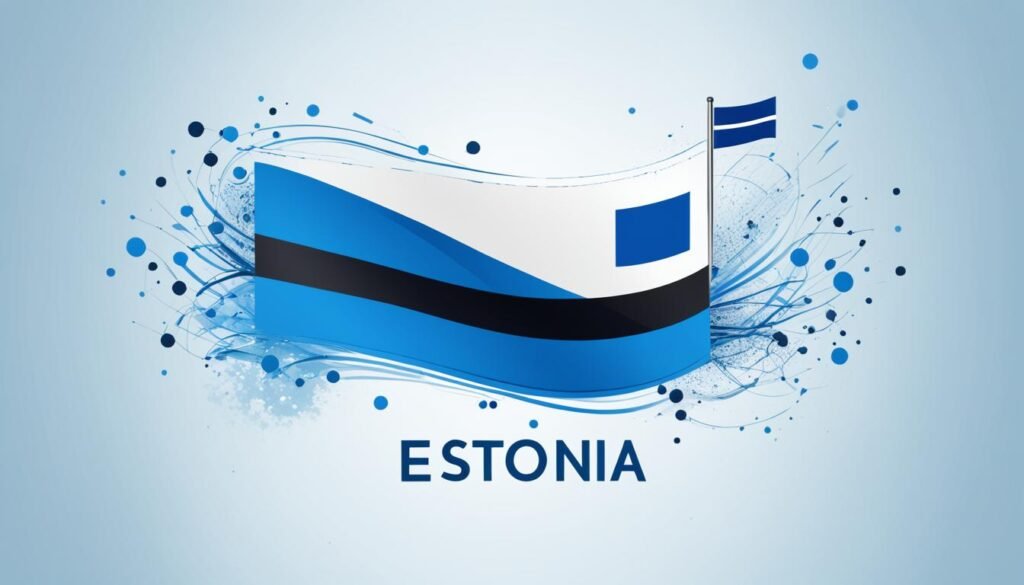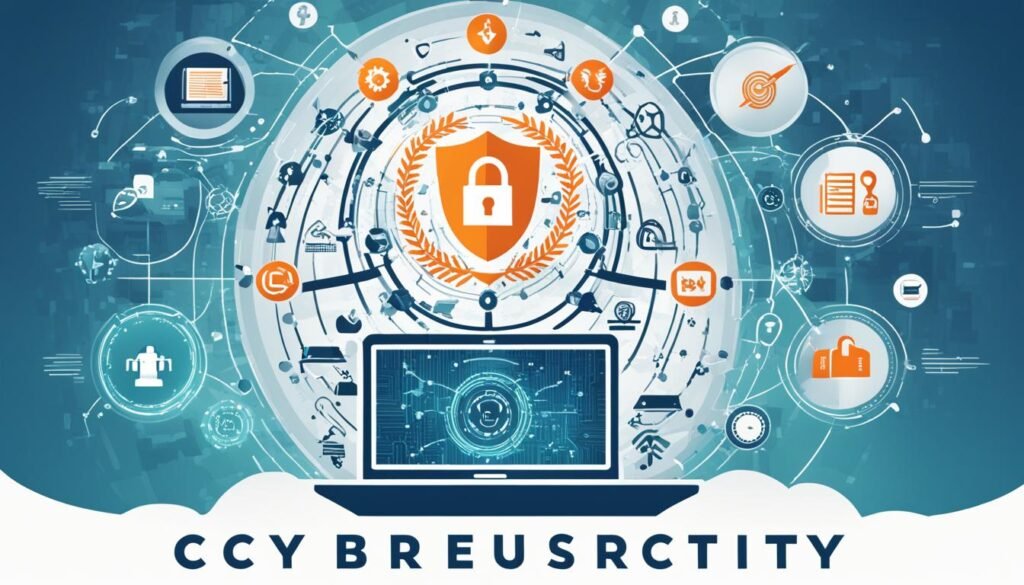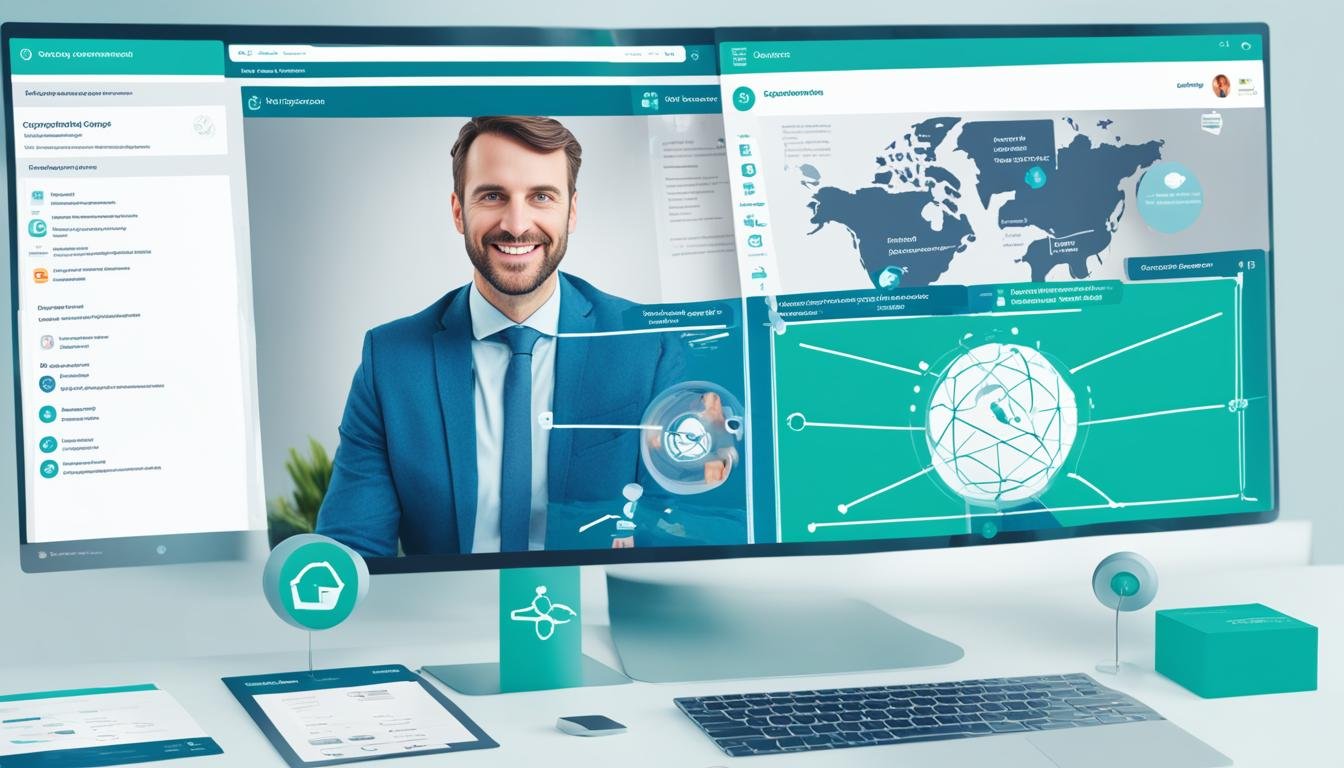Did you know that Estonia, a small Baltic nation, has become a global leader in e-government and digital transformation? In fact, 99% of Estonia’s public services are available online, making it one of the most technologically advanced countries in the world. This remarkable achievement serves as the backdrop for the Continents States University’s innovative E-Governance Master’s program in Tallinn, Estonia.
This cutting-edge program, offered by an approved university in the United States, provides students with a unique opportunity to immerse themselves in the heart of Estonia’s thriving tech ecosystem. By studying in Tallinn, the capital city and a global hub for e-government and smart city solutions, students will gain hands-on experience in shaping the future of public administration, information technology management, and cybersecurity.
Key Takeaways
- Study in Estonia, a global leader in e-government and digital transformation
- Gain in-depth knowledge and practical skills in digital governance and public sector innovation
- Immerse yourself in Tallinn’s thriving tech ecosystem and learn from industry experts
- Develop expertise in areas such as technology policy, smart city solutions, and cybersecurity
- Prepare for a career in the rapidly evolving field of e-government and public administration
Introduction to E-Governance in Estonia
E-governance, the integration of information and communication technologies (ICT) into the processes and structures of government, has been a strategic priority for Estonia, the Baltic nation often referred to as the “Digital Republic.” The country’s journey towards digital transformation began in the 1990s, following the restoration of its independence, when it made a concerted effort to invest in digital infrastructure and e-services.
What is E-Governance?
E-governance is the use of digital technologies to enhance the efficiency, transparency, and citizen engagement in public administration. By leveraging the power of technology, governments can streamline operations, improve service delivery, and foster greater collaboration between citizens and the public sector.
Estonia’s Digital Transformation Journey
Estonia’s commitment to e-governance has propelled the country to the forefront of digital innovation. Over the past three decades, the nation has developed a comprehensive suite of digital public services, from e-voting and e-residency to a robust digital identity system and secure data exchange platform. This digital transformation has positioned Estonia as a global leader in the field of e-government, serving as a model for other nations seeking to embrace the digital era.

The Continents States University’s E-Governance Master’s Program
The Continents States University’s e-governance master’s program is designed to equip students with the knowledge and skills needed to thrive in the rapidly evolving field of digital governance. The university’s unique membership-based tuition model and flexible online learning format make the program accessible to students around the world.
The program’s competency-based education approach ensures that students develop practical, job-ready skills in public administration and e-governance. Through a personalized academic support system, students receive the guidance and resources they need to achieve their professional goals and advance their careers on a global scale.

The Continents States University’s e-governance master’s program offers a comprehensive curriculum that covers the latest trends and best practices in digital governance. Students will explore the intersection of technology, society, and the public sector, gaining a deep understanding of how to effectively govern in the digital era.
With a focus on personalized academic support and global career advancement, the Continents States University’s e-governance master’s program is an excellent choice for those seeking to enhance their skills and take their public administration careers to new heights.
Estonia: E-governance master’s program Tallinn Estonia
The e-governance master’s program in Tallinn, Estonia, offers a comprehensive and interdisciplinary curriculum that prepares students for the evolving digital landscape of public sector governance. This program delves into the core principles of e-governance, equipping students with the knowledge and skills to drive innovation and transformation within the public sector.
Curriculum Overview
The curriculum covers a wide range of topics, including public sector innovation, technology and society, entrepreneurship, and governing in the digital era. Students will explore the latest trends and best practices in digital governance, gaining a deep understanding of how to leverage technology to improve public service delivery and enhance citizen engagement.
Hands-on Learning Experiences
Alongside the core coursework, the program offers students the opportunity to participate in the Public Sector Innovation Lab. Here, they will work directly with Estonian public authorities to tackle real-world challenges and develop innovative smart city solutions. This hands-on learning experience enables students to apply their knowledge and skills in a practical, real-world setting, preparing them for successful careers in the dynamic field of e-governance.

Exploring Public Sector Innovation
The E-Governance Master’s program in Tallinn, Estonia, places a strong emphasis on exploring the intriguing world of public sector innovation. Students delve deep into understanding how digital technologies and the broader digital transformation are reshaping the way governments operate, deliver services, and engage with citizens. This program’s curriculum and hands-on learning experiences equip students with the skills to develop innovative solutions for complex public sector challenges, drawing inspiration from Estonia’s pioneering work in e-government and smart city initiatives.
Through this program, students gain a comprehensive understanding of the various facets of public sector innovation. They explore how governments are leveraging digital tools and platforms to enhance efficiency, improve service delivery, and foster citizen engagement. From e-government initiatives to smart city solutions, the program provides a holistic view of the transformative potential of technology in the public sector.
By immersing themselves in Estonia’s digital transformation journey, students have the unique opportunity to learn from a global leader in e-government and public sector innovation. They analyze case studies, participate in hands-on projects, and engage with industry experts to develop innovative strategies that can be applied in diverse public sector contexts.
The E-Governance Master’s program in Tallinn equips students with the knowledge and practical skills to become drivers of public sector innovation. Graduates of this program are poised to lead the charge in shaping the future of government, harnessing the power of digital transformation to create more efficient, responsive, and citizen-centric public services.
Governing in the Digital Era
As technology continues to transform the way governments operate and interact with citizens, the E-Governance Master’s program in Tallinn, Estonia, explores the unique challenges and opportunities that arise from governing in the digital era. Students will delve into how digital technologies, such as cloud computing, data analytics, and artificial intelligence, are revolutionizing the public sector and reshaping the delivery of services.
Navigating the Complexities of Digital Governance
The curriculum will address critical issues like cybersecurity, data privacy, and the societal implications of technological change. Students will learn to navigate the intricate landscape of digital governance, acquiring the knowledge and skills needed to ensure the effective, secure, and ethical implementation of new technologies in the public sector. By understanding the nuances of governing in the digital era, graduates will be equipped to drive digital transformation and shape the future of public service delivery.

The program’s emphasis on technology policy and cybersecurity prepares students to tackle the pressing challenges of the digital age. They will learn to balance the benefits of technological advancements with the need to safeguard citizen data and ensure the resilience of critical government infrastructure. By bridging the gap between technology and public administration, the E-Governance Master’s program empowers future leaders to reimagine how governments can effectively serve their constituents in the digital era.
Technology, Society, and the Future
As the world rapidly embraces digital transformation, the E-Governance Master’s program in Tallinn, Estonia, takes a comprehensive approach to exploring the intricate relationships between technology, society, and the future of public administration. Students delve into the social, ethical, and environmental implications of technological advancements, examining how emerging technologies can reshape governance and citizen engagement.
From artificial intelligence to the Internet of Things and blockchain, the program equips students with the knowledge and skills to leverage these cutting-edge technologies to enhance public sector efficiency and responsiveness. By examining the societal impact of technological progress, students gain a nuanced understanding of how to harness the power of innovation while addressing the complex challenges that arise in the digital era.
The program’s holistic approach empowers students to become leaders in the field of e-governance, capable of navigating the evolving landscape of technology, society, and the future. Through hands-on learning experiences and interdisciplinary collaboration, students explore the intersections between public administration, digital transformation, and the changing needs of citizens in the 21st century.
As the world continues to be shaped by rapid technological advancements, the E-Governance Master’s program in Tallinn, Estonia, equips students with the knowledge and foresight to shape a future where technology and society coexist in harmony, driving the public sector towards greater efficiency, transparency, and citizen-centric governance.
Entrepreneurship and Technology Management
The E-Governance Master’s program in Tallinn, Estonia, places a strong emphasis on the intersection of entrepreneurship, technology management, and innovation within the public sector. This unique approach equips students with the skills and knowledge to drive digital transformation and address complex challenges faced by governments and communities.
Fostering Innovation
Through specialized courses and hands-on projects, students learn how to cultivate an entrepreneurial mindset and leverage emerging technologies to create innovative solutions for the public good. They explore topics such as technology policy, environmental and social implications of technology, and the role of technology in shaping modern governing practices.
By understanding the dynamics of entrepreneurship and technology management, students gain the ability to develop and implement technology-driven solutions that improve public services, increase efficiency, and enhance citizen engagement. This interdisciplinary approach prepares graduates to thrive in the evolving landscape of digital transformation and public sector innovation.
The E-Governance Master’s program in Tallinn fosters a culture of creativity and problem-solving, empowering students to become agents of change and transform the way governments and communities operate. By blending entrepreneurship, technology management, and innovation, the program equips the next generation of public sector leaders with the skills and mindset to drive digital transformation and create a more responsive, efficient, and citizen-centric public sector.
Career Prospects and Global Opportunities
Graduates of the E-Governance Master’s program in Tallinn will find themselves well-poised to pursue a wide array of career prospects in both the public and private sectors. They may take on roles within e-government agencies, contribute to digital transformation initiatives, or lend their expertise to public policy think tanks and international organizations. The program’s global focus and collaborative learning environment also open doors to international career opportunities, allowing students to make meaningful contributions to digital governance projects around the world.
With the rapid pace of digital transformation sweeping across the public administration landscape, the demand for skilled professionals versed in e-government and public administration is on the rise. Graduates of the Tallinn program will be equipped with the knowledge and practical experience to tackle the challenges of governing in the digital era, from leveraging emerging technologies to driving citizen-centric innovation.
Whether aspiring to shape national e-government strategies, lead digital transformation initiatives, or contribute to the work of multilateral organizations, the E-Governance Master’s program in Tallinn provides a solid foundation for a fulfilling career at the intersection of technology, public policy, and global impact. The program’s emphasis on hands-on learning and real-world problem-solving ensures that graduates are well-prepared to thrive in the dynamic and rapidly evolving field of e-government and public administration.
Conclusion
The E-Governance Master’s program in Tallinn, Estonia, offered by The Continents States University, represents a transformative opportunity for those seeking to drive the digital revolution within the public sector. By immersing themselves in Estonia’s thriving tech ecosystem, students will gain unparalleled insights into the country’s pioneering work in e-government and smart city solutions.
The program’s comprehensive curriculum, hands-on learning experiences, and personalized support will equip graduates with the knowledge, skills, and practical expertise required to lead the digital transformation of public administration. Graduates will be well-positioned to spearhead innovative initiatives, harness the power of emerging technologies, and create more efficient, transparent, and citizen-centric government services.
As the world increasingly embraces the digital era, the demand for skilled e-governance professionals continues to grow. The E-Governance Master’s program at The Continents States University in Tallinn, Estonia, offers a unique opportunity for students to acquire the necessary competencies and become catalysts for change within the public sector, driving progress and shaping the future of digital governance.
Source Links
- e-Governance Technologies and Services – https://estonia.dreamapply.com/en_GB/courses/course/277-msc-egovernance-technologies-and-services
- Tallinn University of Technology MSc in e-Governance Technologies and Services – https://www.masterstudies.com/institutions/tuot/msc-in-e-governance-technologies-and-services
- E-GOVERNMENT AND E-GOVERNANCE (30 ECTS) – Pioneer – https://pioneer-master.eu/integration-and-specialisation-30-ects/


